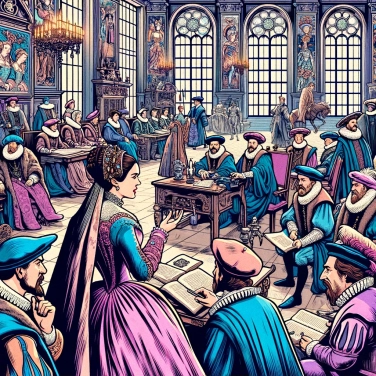Catherine de Medici was an influential figure in the Renaissance due to her role as queen of France as the wife of King Henri II and later as regent for her minor sons. She wielded significant political power and played a key role in the politics and culture of her time.

Catherine de' Medici was born in Florence in 1519 into the powerful Medici family, an extremely influential clan that largely controlled Italian finance and politics. Orphaned at a very young age, she was raised in a tense environment filled with intrigues and political maneuvers. Her destiny changed at the age of 14 when she married Henry of France, the future King Henry II, creating a significant political alliance between France and the Pope (Clement VII, also a Medici). This marriage was a geopolitical coup, strengthening the ties between the two territories. At that time, such a union changed everything in the European political landscape. Catherine then transitioned from a simple Italian heiress to a major figure of the French Renaissance.
Catherine de Medici played an extremely important role in political affairs in France, especially during the reigns of her sons, as they were too young, weak, or not particularly skilled at governing. As a result, it was often she who made the major decisions behind the scenes, like a true unofficial regent. She imposed her style by subtly managing religious conflicts, notably between Catholics and Protestants (the Wars of Religion), sometimes with flexibility and diplomacy, other times outright using force. Through decisions like the January Edict in 1562, which granted some tolerance to Protestants, or conversely her involvement in the tragic St. Bartholomew's Day Massacre in 1572, Catherine influenced all the major political choices of the time. Not loved by everyone, it's clear, but undeniably essential to understand royal power in France in the 16th century.
Catherine de' Medici really loved the arts and used them to impose her image and leave a lasting impression. Of Italian origin, she brought to France a strong taste for beauty, painting, and architecture, with a touch of well-assumed luxury. She actively supported several major artists of the time and commissioned the construction of the Tuileries, a palace meant to be memorable. It is also thanks to her that dance and music gained popularity at court, leading to the creation of the famous Ballet Comique de la Reine, a true ancestor of modern ballet. One could say that she truly shaped the style of the French court, having a lasting influence on the arts during the Renaissance.
At court, Catherine was a true conductor in the delicate art of intrigue. Her secret: skillfully pitting each faction against the other while never appearing overtly involved. She could decipher the machinations of the Guise, staunch Catholics, while also calming the Protestants by carefully juggling conflicting interests. Her network of spies kept her always one step ahead, allowing her to anticipate moves in advance. When it was necessary to strike hard, as during the famous Saint Bartholomew's Day, she did not hesitate to use her political acumen, even if it meant making unpopular decisions. In short, Catherine knew better than anyone how to take advantage of royal chaos while maintaining an impeccable facade!
With her Italian origins and family connections to the Medici, Catherine always keeps a close ear on what’s happening in Europe. She maintains close relations with Italy, Spain, England, and even the Ottoman Empire. Her thing is to skillfully use marriages, alliances, and direct negotiations to preserve peace or strengthen France’s position. In the face of a Europe shaken by religious wars, she plays the card of dialogue and behind-the-scenes intrigue. Catherine even goes so far as to orchestrate spectacular meetings between leaders to show that France still matters. In short, a shrewd and indispensable diplomat in her time.
Catherine de Medici is credited with popularizing the court ballet, the ancestor of classical ballet, fostering the emergence of an entirely new artistic genre during the Renaissance.
Did you know that Catherine de Medici regularly consulted Nostradamus? She is said to have often asked him about the future and royal destinies, thus fueling countless historical legends.
Queen Catherine possessed an exceptional library, part of which contained rare works on astrology and the occult sciences, reflecting her deep interest in these disciplines.
Catherine de Medici is responsible for introducing the fork to France, coming from Italy, thus permanently changing the dining habits of the French.
Catherine de Médicis was an active patron who supported several renowned artists and intellectuals, such as the architects Philibert Delorme and Jean Bullant, as well as writers and poets, notably those belonging to the Pléiade, a literary group of the time. In this way, she contributed to the cultural and artistic prominence of the court.
During the Wars of Religion in France, Catherine de Medici played a complex and strategic role. She sought to maintain the fragile balance between Protestants and Catholics through moderate policies, negotiations, and also intrigues. However, she made controversial decisions, such as those leading to the St. Bartholomew's Day Massacre, a significant event of this period.
Catherine de Medici left a significant historical and architectural legacy in France. In addition to her major political influence, she initiated the construction of the Tuileries gardens and palace in Paris. She also introduced several Italian cultural innovations to the French court, such as fashion, dance, culinary arts, and the refinement of customs.
Catherine de' Medici's popularity among the French people was mixed. While many contemporaries admired her political and cultural intelligence, many viewed her with suspicion due to her foreign origins and her frequent use of intrigue. Her association with the St. Bartholomew's Day Massacre, in particular, contributed to a lasting tarnishing of her image among certain populations.
Catherine de' Medici is known as "the Queen Mother" due to her predominant role as the mother of three successive kings: Francis II, Charles IX, and Henry III. She wielded significant power as a regent and advisor, having a lasting influence on the French politics of that time.

0% of respondents passed this quiz completely!
Question 1/5